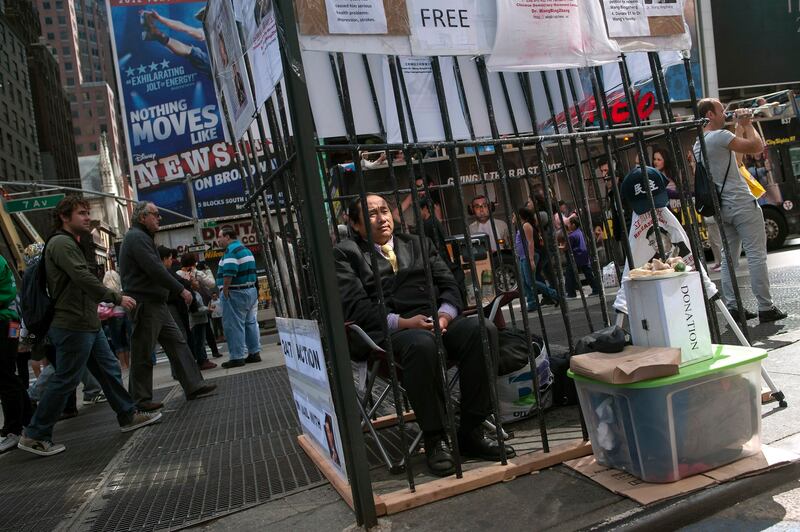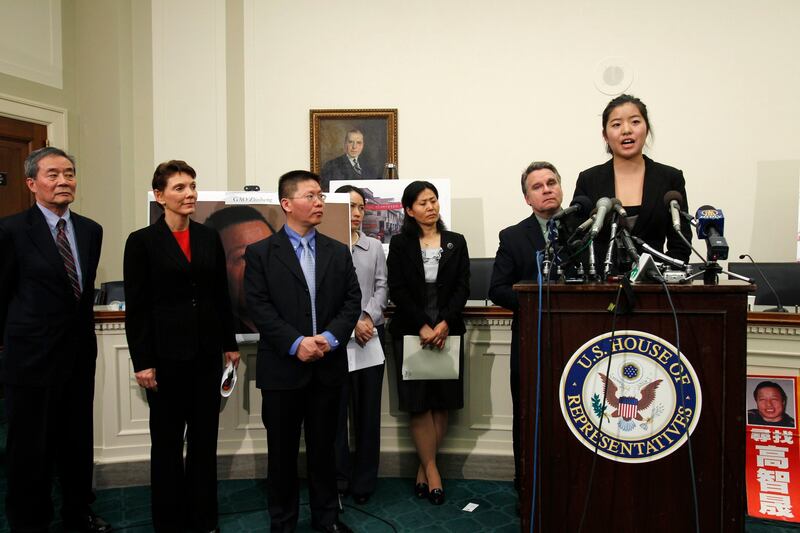The family of jailed veteran democracy activist Wang Bingzhang has said they will relaunch China Spring, the pro-democracy magazine he founded in a bid to 'pass the torch' to the next generation.
Wang's sister Wang Yuhua, who lives in Canada, told Radio Free Asia that the magazine was founded by her brother around the same time that he joined the U.S.-based Chinese democracy movement in 1982, giving up a career in medicine to campaign for political change in China.
The journal was published continuously through 2004, two years after Wang was kidnapped in Vietnam and forcibly returned to China to face trial as a political prisoner.
Wang Yuhua said the family feels that the increasingly authoritarian rule of the Chinese Communist Party under its current leader Xi Jinping has once more put the regime's human rights violations into the international spotlight.
"The whole world is witnessing the CCP regime going further and further in its limitless violation of human rights," she said, referring to the Chinese Communist Party. "Anyone with a sense of justice will feel they should speak out, and do something about it."
"As his family, we feel that we have a responsibility and an obligation to bring back China Spring, which was founded by Wang Bingzhang, and turn it into a powerful voice capable of interpreting history, looking to the future, and continuing the struggle for democracy in China," Wang Yuhua said.
The move comes after Wang's Canadian daughter Ti-Anna Wang was prevented from entering China in January 2019, after she flew there in the hope of visiting him in prison.
The online journal will relaunch with a special issue dedicated to Wang Bingzhang, under the direction of an editorial board that includes Wang Yuhua, former editor-in-chief Sheng Xue and four other prominent overseas activists representing different age groups, in a bid to symbolically "pass the torch" of the overseas democracy movement to the next generation.
"The point is to tell future generations and young people today about the long and difficult path that the Chinese democracy movement has traveled to get to this point, and about how people like Wang Bingzhang have paid a huge price for it," Sheng told Radio Free Asia.
She described the magazine's relaunch as a "major task and glorious mission" for her personally.
Gave up pursuing medicine
Wang was one of the first Chinese nationals to study medicine at postgraduate level overseas, following the economic reforms and opening up policies of then-supreme leader Deng Xiaoping, following decades of relative isolation and political turmoil under Deng's late predecessor Mao Zedong.
But in 1982, he gave up medicine to dedicate himself to the full-time pursuit of democracy in China, moving to New York and founding China Spring in the same year, as well as co-founding several of the first overseas Chinese democratic parties.

Wang spent the next 20 years of his life "organizing and promoting pro-democracy activities in North America and around the world," according to the About page of his official website.
In 1989, he was prevented from entering China during the Tiananmen Square protests, but managed to get back in covertly in 1998, where he was instrumental in helping to found the banned opposition China Democracy Party, only to be arrested and expelled from the country two weeks later.
"Wang toiled relentlessly for the cause he believed in and never gave up his dream for a democratic China ruled by law," the website said.
Tried in secret
Wang traveled to meet with Chinese labor activists in Vietnam in 2002, before disappearing along with two companions and being dumped across the border in China to be arrested by Chinese police.
He was tried in secret by the Shenzhen Intermediate People's Court on Jan. 22, 2003, and handed a life sentence to be served in solitary confinement after being found "guilty" of spying for democratic Taiwan and plotting to bomb the Chinese embassy in Bangkok.
During the trial, no evidence and no witnesses were presented and Dr. Wang was given no information about the charges against him, according to his official website.
"Wang Bingzhang's case was the worst miscarriage of justice in a century," Wang Yuhua said.
Since then, his family and fellow democracy campaigners have continually called for his immediate and unconditional release.
Now, they are very worried about his health, and have scant information about his well-being due to the pandemic, Wang Yuhua said.
"China hasn't let anyone in from overseas during the past three years, so we haven't been able to see him," she said. "He recently had surgery for a small intestinal hernia, which he's still recovering from. We were very anxious when we heard about that because he's 75 now."
Petition for medical parole
The family recently wrote to the director of the Guangdong Prison Administration requesting Wang's release on medical parole, but have received no response.
"The Wang family will not give up, and will keep on trying to get Wang Bingzhang out of prison," she said, breaking down in tears during the interview. "We want him back alive."
Wang's brother Wang Bingwu told Radio Free Asia in September that the family is relaunching the magazine to mark the 20th anniversary of his brother's detention.
"My brother was falsely accused under the Chinese Communist Party’s autocratic system," he said. "The Royal Thai Police have actually issued an official document at our request, saying that they have investigated the matter, and that Wang Bingzhang never engaged in any terrorist activities in Bangkok."

He said the family had also asked the Taiwan government in 2013 to investigate the claim that Wang had spied for them.
"The Taiwan national security bureau provided us with official documents stating that Wang Bingzhang had never given any secrets to Taiwan, nor carried out any espionage work on its behalf," Wang Bingwu said.
He said Wang, who has suffered three strokes already, should be let out on purely humanitarian grounds.
"It's inhumane for an elderly person to be held in solitary confinement," he said. "We won't stand down in this fight until my brother gets out."
Integrating Chinese culture, Bible democracy
He said Wang is occasionally allowed to write letters home, and hasn't mentioned his health problems.
"He is pretty focused on writing another book right now, after studying the Bible, the Yi Ching and Taoism," Wang Bingwu said. "He wants to integrate Chinese culture, the Bible, the U.S. Constitution and democratic processes into a single book, which is his magnum opus."
The relaunch of China Spring comes hard on the heels of nationwide anti-lockdown protests across China, which included calls for Xi Jinping to step down and call elections, echoing the lone banner protest of Peng Lifa on Oct. 13 at a Beijing flyover.
"I was very happy to see so many young people come out during the white paper movement, calling for human rights, freedom and democracy, and for the Communist Party and Xi Jinping to step down," Wang Yuhua said, in a reference to the blank sheets of paper held up by protesters.
"Democracy, freedom and human rights are universal human values ... and promoting them for the people of China is an act of patriotism," she said. "I found that really hopeful."
Translated by Luisetta Mudie. Edited by Malcolm Foster.
